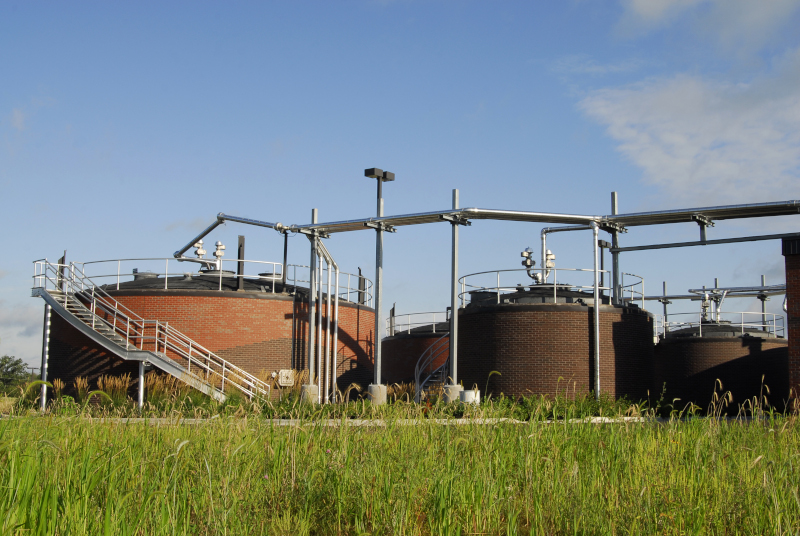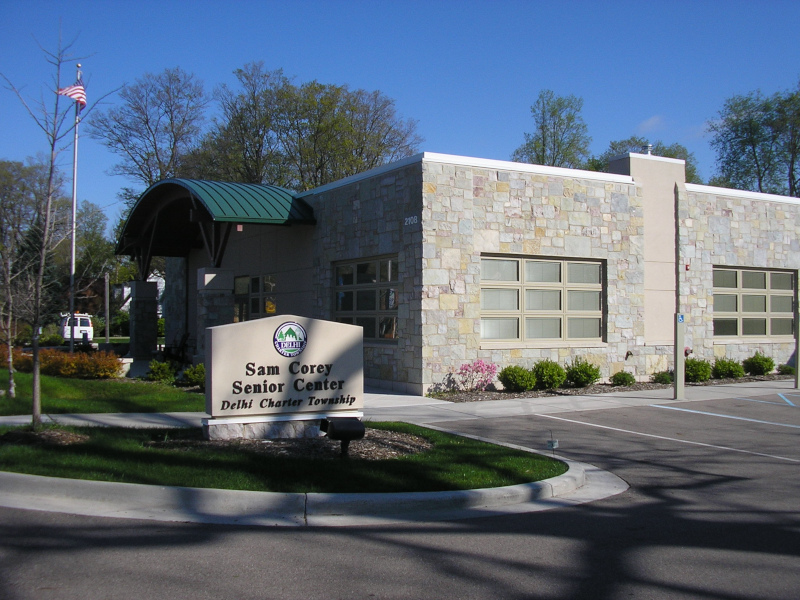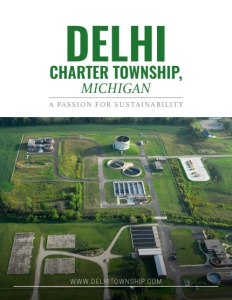Delhi Charter Township, Michigan
A passion for sustainability
Business View Magazine interviews representatives from Delhi Charter Township as part of our focus on best practices of American towns and cities.
Delhi Charter Township is a charter township of Ingham County, Michigan, located 13 miles south of the City of Lansing, the state capital, and 11 miles southwest of Michigan State University. Delhi’s first settlers arrived in 1837 and the Township was established on April 4, 1842. Since then, this diverse community of 26,000 has matured into a vibrant blend of homes and businesses with a passion for sustainability and a good quality of life.
Delhi has excellent schools, a diversified economy, a stable government, and a high level of services for its residents. The Township manages 11 parks, which offer a variety of outdoor recreation opportunities, including playgrounds, baseball diamonds, a sledding hill, a bike/skate park, and an outdoor amphitheater. There is also a beautiful trail system for walking, hiking, and biking. Delhi also has a significant number of industrial and commercial entities, including medical equipment supplier, Block Imaging; aerospace manufacturer, Pratt & Whitney; and RSDC, the largest metal coil and blank processor in North America.

Energy generating digesters
Delhi is also a community that continues to grow and develop. One recently completed project, called Realize Cedar, was the result of 20-plus years of community planning, some innovative financing options, and a strong dedication to public/private partnerships. The township’s role was to redevelop the Cedar Street Corridor by improving sidewalks, street parking, and roadways to create a safer, more walkable community for residents, businesses, and visitors.
“It was a complete renovation of our major commercial corridor,” explains Township Manager, Tracy Miller. “We asked the various tax jurisdictions that participate with us in our Downtown Development Authority, which utilizes Tax Increment Financing, to help in funding the project by extending the duration of our tax capture period, and all but one of the jurisdictions agreed (which in this day and age, is almost completely unheard of). But we were successful in that because of our demonstrated capacity to implement the project. And, ultimately, as a result of our Downtown Development Authority projects in the past, we have been able to demonstrate a marked increase in taxable value, which benefits the taxing jurisdictions. So, they generally viewed it as a pretty good return on their investment and they agreed to allow us ten additional years of tax capture. Once we had those agreements secure, we bonded so that we could raise roughly the $7.5 million we needed to do the project.”
“But at the end of the day, it’s the private sector that creates development,” Miller continues. “All we can do, as a municipality, is create an environment that’s conducive and supportive, and that is what Realize Cedar was all about – place-making and creating an environment that residents had been wanting for 20-plus years. We’ve invested a ton of money doing land assembly so that there are reasonably-sized redevelopment sites available to fill in along the Realize Cedar project, and we built the infrastructure backbone on which the private sector can make the investments and finish the vision. And we’ve already seen some return on that infrastructure investment: Esker Square.” Esker Square is a $12 million, three-story, mixed-use development that will house apartments, retail, and office space on Cedar Street. The project is the first private development as a result of the Realize Cedar initiative and will likely pave the way for more privately-financed development. “Esker Square is precisely the type of private investment that we were hoping would be attracted by the infrastructure backbone that we established,” says Miller.
Delhi is also a community that places a strong focus on sustainability and environmental stewardship. The developer of Esker Square, The Gillespie Company, partnered with the Delhi Brownfield Redevelopment Authority and the Michigan Department of Environmental Quality to clean up environmental contaminants in the soil on the construction site. Environmental pollutants from previous property owners originally made the property unsafe and undesirable for redevelopment. The Delhi Brownfield Redevelopment Authority, which has a long history of cleaning up contaminated properties, worked with The Gillespie Company to ensure that the proper steps were taken to turn the once blighted property into a site ready for commercial development. It’s all a part of the Delhi DDA’s efforts to create a vibrant downtown area that attracts residents, businesses, and jobs while boosting local property values.
“We were the first township in Michigan to get a gold designation in the Green Communities Challenge,” states POTW (Publicly Owned Treatment Works) Director, Sandra Diorka. The Michigan Green Communities Challenge is an annual program administered by the Michigan Municipal League, the Michigan Association of Counties, and the Michigan Township Association in conjunction with the State of Michigan’s Department of Environmental Quality and the Michigan Economic Development Corporation. Its purpose is to serve as a guide to help communities measures their progress towards sustainability. “Since 2012, we’ve maintained a gold level,” adds the Township’s Environmental Coordinator, Allen Bryant. “In 2019, there were only ten communities in Michigan to achieve that.”

Holt’s first LEED certified building
Another one of Delhi’s major sustainability projects concerns its wastewater processing plant. Around 15 years ago, the Township needed some extra capacity in processing what Diorka calls the “bio-salad,” essentially, the excrement that goes into its wastewater processing plant from the town’s sewers. “We decided that we wanted to go for Class-A product, which is the highest and safest quality from a wastewater plant,” she explains. “We applied for grant to get a piece of equipment that would generate electricity from the methane gas. Forever, wastewater plants have been employing a technology called anaerobic digestion. It’s the same thing that goes inside everyone’s gut; the bugs that live in our intestine that make gas are the same bugs that we have in our process. They come in the excrement and we give them a home where it’s warm and ideal for their existence; the more excrement we feed them, the more methane gas they make. We harness the gas that they make to heat the process and also to make electricity. It’s called a combined heat and power process.”
“Prior to implementing this digester process that combines heat and power, with the digester that we had, all that gas was just wasted, it flared off,” Bryant adds. “With this process, we were able to capture it. A lot of treatment plants just flare off their methane.”
Diorka continues, “We had a subsequent project that took away some of the food from the bugs and our process became upset – it didn’t have enough excrement. We thought about what we could do to supplement the excrement, and the obvious answer was food. So, we decided to partner with our schools to collect the waste food from their lunches; any food that the kids don’t eat, they separate out and we put that into our digester. But we still needed more. One day, at a conference, Allen and I were talking to someone from a neighboring community and they said that their wastewater plant was really having a hard time because there was a brewery in town that was discharging waste from the beer-making process and it was too much of a load for their wastewater plant, causing them to violate the Clean Water Act. They said that they had heard that we had a digester and that maybe we could help them out.
“We entered into discussions with the brewery and did some studies with Michigan State University that showed that the beer waste would work well. We partnered with the brewery to bring their waste to us and we put it in the digester and that’s really helped out our system and we’ve increased our gas production. When they bring the beer waste, we get more gas, and therefore, more heat and more electricity. So, it’s been a win/win. The brewery doesn’t have to worry about the violations in their city, and their waste is actually making green energy for us.”
“The cool thing about this is that it helps our goal of being as self-sustaining as possible in terms of our generation of electricity and gas for the operation of the plant, itself, but it also really speaks to public/public partnerships, and public/private partnerships.” Miller notes. “The public/private partnership is the relationship with the microbrewer, which is a huge industry in Michigan; it opened some doors there and helped create a model that can be replicated elsewhere. But, the partnership with the school to get the food waste is really also innovative and a pretty significant undertaking. It used to be that we had to have somebody go through the food waste and pick out the items that the kids hadn’t separated out. But we just invested in a big piece of equipment we call ‘Scrappy.’ We dump the food waste that we collect from the schools into the Scrappy machine, and it takes out all of the sporks and the wrappers, so that it can be fed into the digester without having to have a person picking through trash.”
“We’ve done these efforts because they made sense,” says Diorka. “The environmental efforts have been embraced by the community.” Bryant agrees. “In 2008, the Sam Corey Senior Center was the first green-certified building that Delhi Township built; it’s got geo-thermal heat and a living roof,” he reports. “And with our state-of-the-art recycling center, we have some new receptacles going in that will increase our sustainability efforts there and allow us to reduce the number of trips back and forth from the recycling center to the company that processes everything. We put a priority on investing in these services because they have made our Township such a great place to live, work, and raise a family.”
AT A GLANCE
WHO: Delhi Charter Township
WHAT: A community of 26,000
WHERE: Ingham County, Michigan, south of Lansing
WEBSITE: www.delhitownship.com




